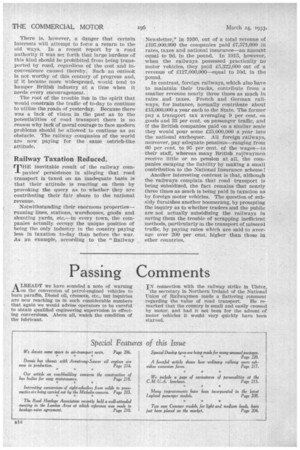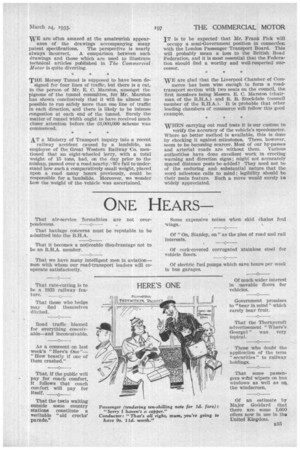Passing Comments
Page 28

Page 29

If you've noticed an error in this article please click here to report it so we can fix it.
ALREADY we have sounded a note of warning on the conversion of petrol-engined vehicles to burn paraffin, Diesel oil, creosote, etc., but inquiries are now reaching us in such considerable numbers that again we would advise operators to be careful to obtain qualified engineering supervision in effecting conversions. Above all, watch the condition of the lubricant.
IN connection with the railway strike in Ulster, the secretary in Northern Ireland of the National Union of Railwaymen made a flattering comment
regarding the value of road transport. He remarked that the country is small and easily crossed by motor, and had . it not been for the advent of motor vehicles it would very quickly have been starved,
WE are often amazed at the amateurish appearance of the drawings accompanying many
patent specifications. The perspective is nearly always incorrect. A comparison between such drawings and those which are used to illustrate technical articles published in The Commercial Motor is quite diverting.
THE Mersey Tunnel is supposed to have been de
signed for four lines of traffic, but there is a cat, in the person of Mr. E. C. Marston, amongst the pigeons of the tunnel committee, for Mr. Marston has shown conclusively that it will be almost impossible to run safely more than one line of traffic in each direction, and there is likely to be intense congestion at each end of the tunnel. Surely the matter of tunnel width ought to have received much closer attention before the f3,000,000 scheme was commenced.
AT a Ministry of Transport inquiry into a recent railway accident caused by a landslide, an employee of the Great Western Railway Co. mentioned that an eight-wheeled lorry, with a total weight of 15 tons, had, on the day prior to the mishap, passed over a road nearby.--,We fail to understand how such a comparatively small weight, placed upon a road many hours previously, could be responsible for a landslide. Moreover, we wonder bow the weight of the vehicle was ascertained.
IT is to be expected that Mr. Frank Pick will occupy a semi-Government position in connection with the London Passenger Transport Board. This will probably mean a loss to the British Road Federation, and it is most essential that the Federation should find a worthy and well-respected successor.
WE are glad that the Liverpool Chamber of Com
merce has been wise enough to form a roadtransport section with two seats on the council, the first members being Messrs. E. C. Marston (chairman of the R.F1.A.) and R. B. StockdaIe (council member of the R.H.A.). It is probable that other leading chambers of commerce will follow this good example.
WHEN carrying out road tests it is our custom to
verify the .accuracy of the vehicle's speedometer. Where no better method is available, this is done by checking it against milestones. These, however, seem to be becoming scarcer. Most of our by-passes and arterial roads are without them. Various authorities have done excellent work in erecting warning and direction signs ; might not accurately spaced distance posts be {{tided? They need not be of the enduring and, substantial natnre that the word milestone calls to mind ; legibility should be their main feature. Such a Move would surely be widely appreciated.




























































































